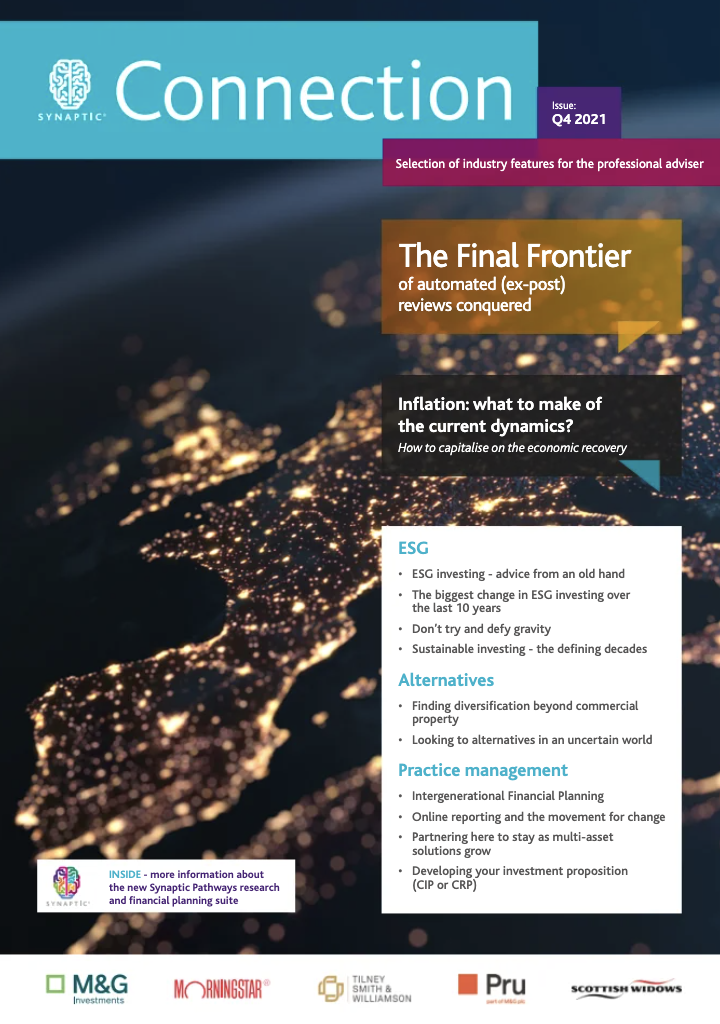In this edition...
- The final frontier of research and due diligence conquered Eric Armstrong, Client Director
- Hours to minutes Eric Armstrong, Client Director
- World Economic and Market Outlook Graham O’Neill, Senior Investment Consultant, RSM.
- Inflation – what to make of the current dynamics Maria Municchi, Fund Manager, Sustainable Multi Asset Fund Range M&G Investments
- Sustainable Investing – advice from an old hand Hugo Thompson, Multi-Asset Investment Specialist HSBC Asset Management
- The biggest changes in ESG investing over the last 10 years Mark Coles, Head of Nationals & Networks Tilney Smith & Williamson
- Don’t try and defy gravity Catriona McInally, Business Development Manager – Investments Prudential
- Sustainable investing – the defining decades Hamish Chamberlayne, Head of Global Sustainable Equities | Portfolio Manager Janus Henderson
- Finding diversification beyond commercial property Shayan Ratnasingam, Investment Manager Liontrust Multi-Asset team
- Looking to alternatives in an uncertain world Chris Forgan, Portfolio Manager Fidelity Multi Asset
- Developing your investment proposition (CIP or CRP) David A Norman (DAN), CEO, TCF Investment
- Intergenerational Financial Planning Gareth Davies, Pension Specialist, Scottish Widows
- Is your online client reporting up to scratch? Natalie Holt, Content Editor, The Lang Cat
- Partnering here to stay as multi-asset solutions grow Antony Champion, Head of Intermediaries, Brewin Dolphin
- How to Capitalise on the Economic Recovery, Including Morningstar’s Portfolio Positioning Leslie Alba, Associate Director, Research Morningstar Investment Management Europe
- Unemployment insurance is back Kesh Thukaram, Co-Founder Best Insurance
I've been thinking recently about the use of technology in advice firms, and the moves afoot to make businesses more efficient.

"Advisers and clients have largely embraced this shift, and people are coming to realise there may well be instances where delivering advice remotely can actually trump the traditional face-to-face offering."
Some of this thinking has sprung from hearing about several new (to me anyway) adviser support businesses that have come to the UK market in recent years, offering services such as cash management, CRM software and digital marketing.
The common thread running through all these companies is the emphasis on online and digital ways of working. Other closely linked themes that these firms major on are around automation and APIs.
Love it or loathe it, many of us have had to get a whole lot better at using technology within a remote/home working environment. Advisers and clients have largely embraced this shift, and people are coming to realise there may well be instances where delivering advice remotely can actually trump the traditional face-to-face offering.
It's true to say that while things like review meetings are proving to be more convenient for all parties when carried out over Zoom, Teams and the like, other aspects such as winning new business can be more challenging. It can be hard (though not impossible) to build rapport through a screen alone.
Yet anecdotally, some advisers have found remote advice does offer distinct and perhaps surprising advantages. One good example I've heard is when it comes to intergenerational planning. Grouping a family together in the clients' lounge while you discuss the various assets and investments in play can give the impression the children are after the money, whereas remote advice can help provide that bit of distance.
Another example might be recorded meetings, a process some firms may have already had in place pre-Covid. Watching back an online call offers a moment of self-reflection – both for advisers to consider what went well and what could be improved, and for clients to digest and think back on what can often be some pretty weighty planning conversations.
The current state of play
The shifting sands on how advice firms currently use technology, and where they and their clients would like to get to, is one of the many issues we've been examining as part of our biggest adviser research exercise of the year, State of the Adviser Nation, or SOTAN to its friends.
The survey is huge, and the findings track all manner of trends within the advice profession, including business growth and ownership, the daily challenges and frustrations faced by firms, clients and value, and a lot more besides.
To narrow things down somewhat, here I'm going to focus on the still very big topic of technology, and within that, online reporting and investment portfolios.
A quick caveat before we get into the numbers. At the time of writing these are preliminary findings, so things may shake out slightly differently by the time we've finished collating all the responses. But they give a useful indicator of where we're at nonetheless.
So, what does the data tell us?
Let's start by looking at the current picture. Based on around 300 responses from advice professionals, 42% say they are not using a technology solution when it comes to making sure a client's investments are structured in the best way possible (something we grandly refer to as portfolio/investment optimisation). Less than a third do portfolio reviews side by side with clients, though a similar proportion are choosing to carry these out remotely with clients instead.
We then asked about advisers' personal preference in how they would like to use technology with clients. More people said they'd like to do portfolio reviews remotely with clients, though there was also a general sense that as far as clients were concerned, it didn't really matter too much whether this was done digitally or face-to-face.
Yet an interesting picture is emerging on online reporting. We were specifically keen to understand whether advisers were using their own portal here, rather than a provider-sourced one.
It's a mixed bag at the moment – while 44% say they do this remotely with clients, the same proportion say they're not offering online reporting, at least not through their own system. But when it comes to personal choice, the figures are stark. Some 71% say they would want to do online reporting remotely with clients if they could, and over half of respondents believe their clients would feel the same way.
Starting over
This all suggests that online reporting is important – the advice firms who aren't offering this already believe this, and the suggestion is that clients would like online reporting to be more widely available too.
To get a complete sense of where advisers' heads are at on the systems they interact with, we asked one more question: If you were back starting your business from scratch, with no repercussions, would you pick the same kit that you use now?
Tools and services such as cashflow modelling, platforms and risk profiling performed strongly, with many respondents saying they would choose their current systems all over again. But it was client reporting and client portals where people started to waver. Some 42% said they would choose a different approach to client reporting, and just under half said they would go for a different client portal.
One of the things working through the pandemic has shown us is there is a greater expectation for online and hybrid service to be seamless. In the last couple of years we have proved what is possible. Yet there is room for further progress, and for advice and financial services to match the online capability seen in other sectors. The next 18 months may be an opportune time to examine whether your tech is working for you and your clients as you want it to be – or whether it's lacking.
For more insight from the lang cat, visit www.platform-analyser.com which you can also use to run due diligence reports, compare platforms, add in bespoke pricing deals and more.
Sign up for updates
Keep up to speed with everything you need to know each quarter, by email or post.


